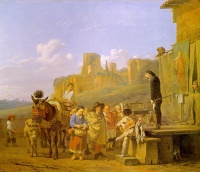Staging (theatre, film, television)
From The Art and Popular Culture Encyclopedia

Illustration:Theatrum Orbi engraving by Theodor de Bry from the chapter on Ars Memoriae in Utriusque cosmi maioris scilicet et minoris metaphysica by Robert Fludd.
|
Related e |
|
Featured: |
Staging is the process of selecting, designing, adapting to, or modifying the performance space for a play or film. This includes the use or absence of stagecraft elements as well as the structure of the stage and its components.
Staging is also used to mean the result of this process, in other words the spectacle that a play presents in performance, its visual detail. This can include such things as positions of actors on stage (often referred to as blocking), their gestures and movements (also called stage business), the scenic background, the props and costumes, lighting, and sound effects. Besides costume, any physical object that appears in a play has the potential to become an important dramatic symbol. The first thing that the audience of a play sees is the stage set, the physical objects that suggest the world of the play. The stage set is usually indicated by the playwright, but the degree of detail and specificity of this rendering vary from one playwright to another and from one literary period to another. In film, staging is generally called set dressing.
While from a critical standpoint, "staging" can refer to the spectacle that a play presents in performance, the term is also frequently used interchangeably with the term "blocking", referring to how the performers are placed and moved around the stage. Many audience members may believe that performers move spontaneously on the stage, but blocking/staging is rarely spontaneous. Major points of blocking are often set down by the playwright, but blocking is usually done by the director, sometimes in collaboration with performers and designers.
Historically, the expectations of staging/blocking have changed substantially over time in Western theater. Prior to the movements towards "realism" that occurred in the 19th century, most staging used a "tableau" approach, in which a stage picture was established whenever characters entered or left the stage, assuring that leading performers were always shown to their best advantage. In more recent times--while nothing has changed about showing leading performers to best advantage-- there have been changing cultural expectations that have made blocking/staging more complicated.
In the modern theater, there are purely mechanical reasons why blocking is crucial. Stage lighting is focused on specific parts of the stage at specific moments, and the performer must be sure to be on his or her "mark" or "spike" or they may not be well lit. Blocking also assures that the stage picture gives the proper focus to the proper places, and that transitions occur smoothly. This becomes even more crucial as modern stage technology allows for ever more elaborate special effects.
There are also artistic reasons why blocking can be crucial. Through careful use of positioning on the stage, a director or performer can establish or change the significance of a scene. Different artistic principals can inform blocking, including minimalism and naturalism.
The Stage Manager is responsible for recording blocking and assuring that the blocking is followed.
See also


